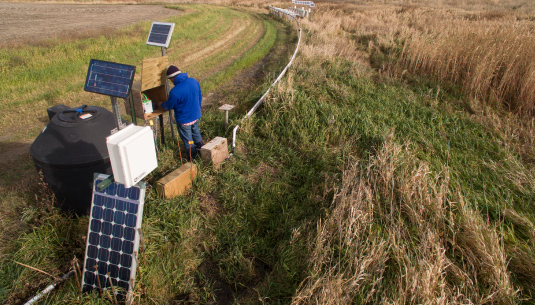
Impact and partners
The Minnesota Department of Agriculture (MDA) has several staff members that implement the Minnesota Agricultural Water Quality Certification Program (MAWQCP). Individual conservation specialists running the program work very closely with farmers who apply to ensure their success in certification. When the farmer has implemented the BMPs that were recommended, the MDA sends out an expert auditor to sign off on the approval of the implementation.
Process and problem solved
Farmers can employ Best Management Practices (BMPs) to improve the soil, minimizing runoff, and generally improving stewardship of the land. The MDA and GEMS partnership is a unique opportunity for a large-scale scientific study to provide evidence that the BMPs yield positive environmental effects while respecting farmer privacy concerns.
GEMS Service Used
Helping farmers be good land stewards
The MDA and GEMS are ideal partners to link farmer BMPs to actual downstream environmental outcomes. The MDA's water quality certification program has implemented over 2,900 new on-farm conservation practices across the state. GEMS has data security and handling capabilities that preserve farmer privacy plus highly skilled data scientists, relevant analytic tools and data sets. The MDA-GEMS partnership is using AI algorithms and MDA “ground truth” BMP data to form robust classifiers of each BMP. These classifiers are then used to create a statistical assessment of the BMPs used in the 95% of Minnesota farms presently not certified. The resulting classification can be used to link water quality outcomes – subject to constraints of geography – with a progressively expanding set of BMPs. All resulting data will be reported in aggregate.
Results
- Science-based assessments of which BMPs affect lake water quality under what conditions.
- MDA will be able to make confident recommendations to farmers about which BMPs they should apply given their particular circumstances
